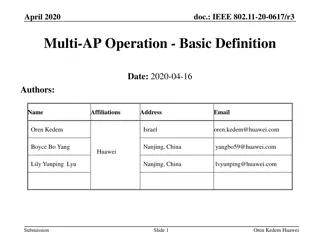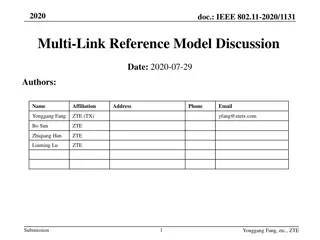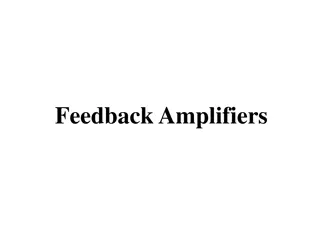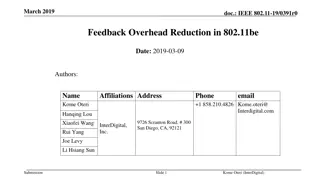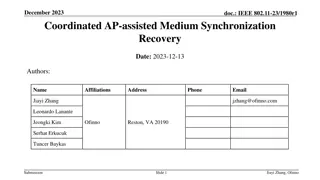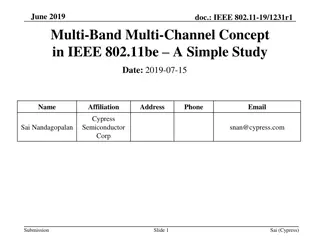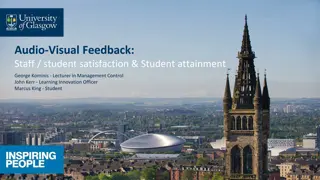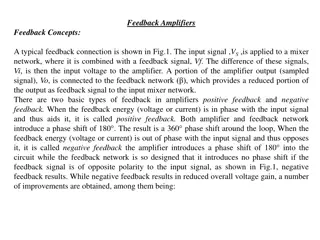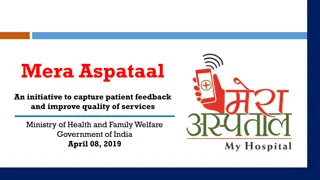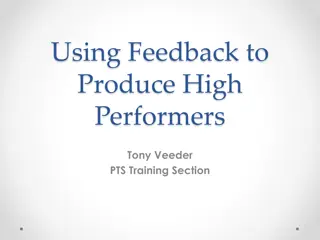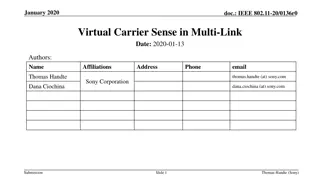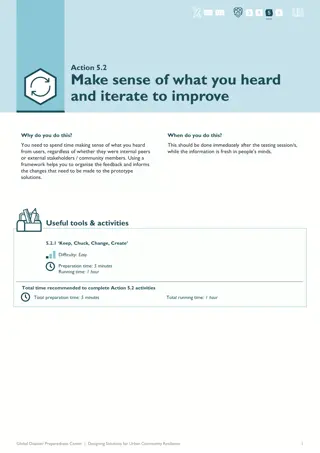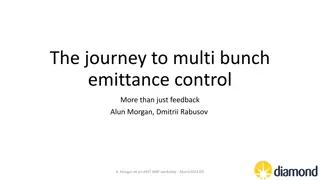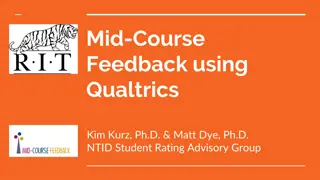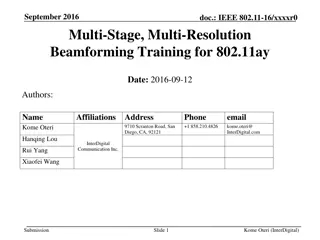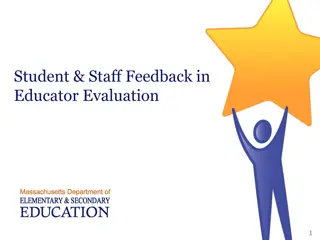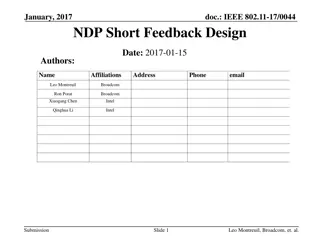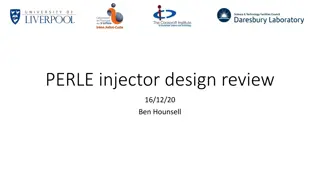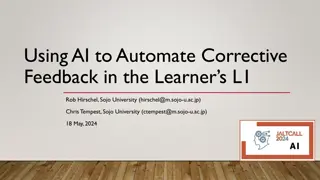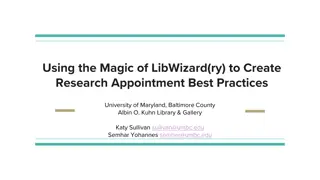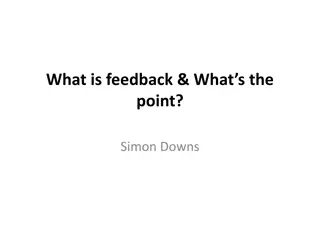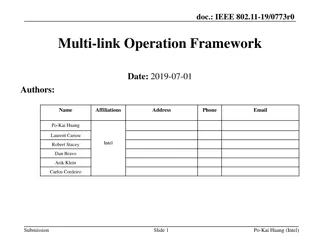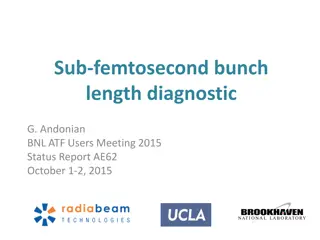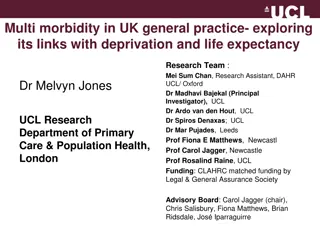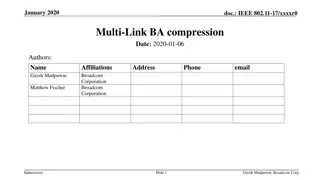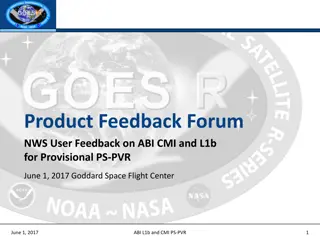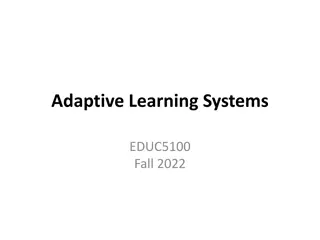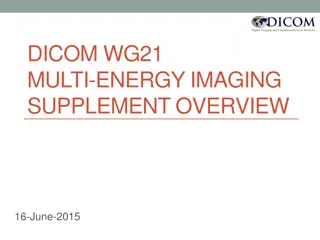Enhancing Student Learning Through Effective Feedback Strategies
Effective feedback plays a crucial role in improving student learning outcomes by providing specific information that students can use to enhance their performance. This content explores the importance of feedback, examples of good feedback practices, qualities of good feedback, and what components
5 views • 16 slides
Effective Feedback Strategies for Learning Enhancement
Feedback plays a crucial role in the learning process. This session focuses on strategies for providing effective feedback to improve learning outcomes, course, and assignment design, best practices, and tools for efficient feedback delivery. Understanding the importance of prompt feedback and diffe
3 views • 20 slides
Understanding Multi-AP Operation in IEEE 802.11-20-0617/r3
Explore the basic definitions and key features of Multi-AP operation in the IEEE 802.11 standard. Learn about Multi-AP Candidate Set (M-AP-CS) and Multi-AP Operation Set (M-AP-OS) along with their participants and formation. Delve into the concepts of Coordinator AP, Coordinated AP(s), and reliable
0 views • 19 slides
IEEE 802.11-2020 Multi-Link Reference Model Discussion
This contribution discusses the reference model to support multi-link operation in IEEE 802.11be and proposes architecture reference models to support multi-link devices. It covers aspects such as baseline architecture reference models, logical entities in different layers, Multi-Link Device (MLD) f
1 views • 19 slides
Understanding Feedback Amplifiers: Structure, Properties, and Topologies
Electronic circuits rely heavily on feedback mechanisms, particularly negative feedback, for various purposes such as desensitizing gain, reducing distortion, controlling impedance, and improving amplifier bandwidth. This article explores the general structure of feedback, properties of negative fee
0 views • 68 slides
Reduction of Feedback Overhead in IEEE 802.11be
Discussion on reducing channel acquisition overhead to support 16 Spatial Stream MIMO and Multi-AP coordination in IEEE 802.11be. Methods include limiting feedback information, using implicit feedback in reciprocal systems, and improving explicit and implicit feedback schemes.
0 views • 14 slides
IEEE 802.11-23/1980r1 Coordinated AP-assisted Medium Synchronization Recovery
This document from December 2023 discusses medium synchronization recovery leveraging multi-AP coordination for multi-link devices. It covers features such as Multi-link device (MLD), Multi-link operation (MLO), and Ultra High Reliability (UHR) capability defined in P802.11bn for improvements in rat
0 views • 8 slides
Understanding Multi-Band Multi-Channel Concept in IEEE 802.11be
Exploring the benefits of Multi-Band Multi-Channel (MBMC) operation in IEEE 802.11be, this study delves into the efficient use of spectrum, increased data rates, and network load balancing. It also discusses the envisioned usage models and compares Single Band Operation with Multi-Band Operation, hi
1 views • 20 slides
Enhancing Feedback Practices with Audio-Visual Technology: A Study on Student Satisfaction and Attainment
This presentation delves into the implementation of Audio-Visual Feedback (AVF) technology to improve assessment feedback practices in an educational institution. The study explores the impact of AVF on student satisfaction levels compared to traditional written feedback, as well as its influence on
0 views • 21 slides
Understanding the Importance of Feedback in Achievement Enhancement
Feedback plays a crucial role in encouraging or discouraging behavior, making it essential to provide constructive feedback that focuses on growth and improvement. Improper feedback can lead to incompetence in the workplace. Learn about the definition of feedback, how to give feedback effectively, a
2 views • 22 slides
Understanding Feedback Amplifiers in Electronic Circuits
Feedback amplifiers play a crucial role in electronic circuits by providing mechanisms for controlling gain, stability, and overall performance. There are two basic types of feedback - positive and negative, each offering distinct advantages. The four ways of connecting feedback signals involve volt
0 views • 18 slides
Mera Aspataal: Improving Patient-Centric Care in India
Mera Aspataal is an initiative by the Ministry of Health and Family Welfare, Government of India, aimed at capturing patient feedback to enhance the quality of healthcare services. Through a user-friendly ICT-based system, patients can provide feedback quickly, enabling healthcare providers to deliv
1 views • 29 slides
Enhancing Feedback Strategies in ELA Learning Project Day
Refine understanding of ELA, engage with student exemplars, and design constructive feedback in a structured agenda. Activities include generating feedback, digging deeper into feedback processes, and considering the impact of timely and specific feedback on student growth in learning and skills. Co
0 views • 31 slides
Effective Feedback Strategies for Resident Teachers
Effective feedback is critical for the growth of resident teachers. This guide covers types of feedback, why it's important, what makes feedback effective, behaviorally anchored rating scales, models for giving feedback, and key tips for delivering feedback successfully.
0 views • 14 slides
Effective Feedback Strategies for High Performance
Feedback plays a crucial role in helping individuals improve performance and reach their full potential. From providing helpful feedback to reinforcing desired behaviors, this guide explores various strategies, including redirection, reinforcement, and F.A.S.T. feedback, to enhance workplace perform
0 views • 21 slides
Virtual Carrier Sense in Multi-Link Networks
This document discusses the implementation and advantages of virtual carrier sense in multi-link networks under the IEEE 802.11 standard. It explores the operation of multi-link setups, asynchronous communication benefits, and the necessity of multiple contention channels. The concept of NAV (Networ
2 views • 11 slides
Enhancing Postgraduate Academic Writing: Feedback Collaboration Model
Developing a collaborative model for postgraduate academic writing courses involves understanding the role of feedback, focusing on content feedback, and exploring the intersections between discipline specialist and writing tutor feedback to improve academic writing abilities. Feedback offers valuab
1 views • 27 slides
Iterative Feedback Framework for Prototype Improvement
The iterative feedback framework involves making sense of user feedback using the Keep, Chuck, Change, Create (KCCC) model to iterate and enhance prototype solutions. This process helps organize input from testing sessions, informing necessary modifications for better outcomes. The framework emphasi
1 views • 26 slides
Performance Aspects of Multi-link Operations in IEEE 802.11-19/1291r0
This document explores the performance aspects, benefits, and assumptions of multi-link operations in IEEE 802.11-19/1291r0. It discusses the motivation for multi-link operation in new wireless devices, potential throughput gains, classification of multi-link capabilities, and operation modes. The s
0 views • 30 slides
Enhancing Emittance Control Strategies in Particle Accelerators
The journey to multi-bunch emittance control goes beyond mere feedback mechanisms, involving nuances like pinhole cameras as detectors and skew quadrupole magnets as actuators. This innovative approach aims to overcome limitations of existing systems like coupling control issues and hysteresis perfo
0 views • 16 slides
Understanding Mid-Course Feedback Using Qualtrics
Mid-Course Feedback (MCF) is a valuable process that allows students to provide feedback on their courses mid-semester, impacting teaching strategies, communication, materials, and more. This feedback benefits both students and instructors by improving teaching effectiveness, student satisfaction, a
0 views • 21 slides
Advancing Electron Beam Formation via Ionization Injection Seeding for Next-Generation Accelerators
Long-term R&D proposal outlines the development of an all-optical electron source at BNL using longer-wavelength lasers, aiming to characterize plasma wake profiles and advance laser wakefield acceleration. The project involves utilizing a 10-m laser, ionizing gas targets, and optimizing laser pulse
0 views • 9 slides
Multi-Stage, Multi-Resolution Beamforming Training for IEEE 802.11ay
In September 2016, a proposal was introduced to enhance the beamforming training procedures in IEEE 802.11ay for increased efficiency and MIMO support. The proposal suggests a multi-stage, multi-resolution beamforming training framework to improve efficiency in scenarios with high-resolution beams a
0 views • 11 slides
Importance of Student and Staff Feedback in Educator Evaluation
Student and staff feedback plays a crucial role in educator evaluation, providing valuable insights into areas of strength and growth. Informed by evidence such as surveys, observations, and artifacts, feedback helps educators tailor their practice, fostering two-way communication and professional d
0 views • 14 slides
Scaling of High-Energy e+e- Ring Colliders and Proposed Parameters
Scaling of high-energy e+e- ring colliders has been proposed for energy levels exceeding 200GeV by various authors. The suggested collider possibilities include different tunnel configurations and collider designs. Common features for reducing synchrotron radiation include large circumferences and l
0 views • 15 slides
Understanding Cascade Control Systems in Industrial Processes
Cascade control systems play a crucial role in improving process control efficiency by incorporating feedback loops within feedback loops. This type of control architecture helps to better handle disturbances and variations in the process by creating secondary loops that monitor specific parameters.
0 views • 8 slides
IEEE 802.11-17/0044 NDP Short Feedback Design
The document discusses the need for short simultaneous feedback from multiple STAs in IEEE 802.11 systems for improved efficiency. It introduces the NDP feedback mechanism and proposes a signaling technique to efficiently collect feedback from a high number of STAs. The mechanism involves UL MU tran
0 views • 19 slides
Overview of PERLE Injector Design & ALICE Electron Gun Re-optimisation
The PERLE injector, part of the Powerful Energy Recovery Linac for Experiments (PERLE), operates at 7 MeV injection energy with a bunch charge of 500 pC and a bunch repetition rate of 40.1 MHz. The layout includes a DC photoemission electron gun, bunching and focusing sections, and a superconducting
0 views • 50 slides
AI Automation for Corrective Feedback in Language Learning
Exploring the utilization of AI technology to automate and enhance corrective feedback in language learning, addressing challenges such as time constraints, delayed feedback, and student comprehension. Introduction of a new AI text tool by Marcus Green for accessible and effective feedback provision
0 views • 13 slides
Enhancing Research Appointment Services at UMBC Library
UMBC subject librarians implemented a feedback survey to improve research appointment services. By analyzing feedback data, shared best practices were developed to ensure quality and consistency. The project timeline included identifying goals, drafting the timeline, creating the feedback form, and
0 views • 7 slides
Understanding the Importance of Feedback in Learning and Development
Feedback plays a crucial role in providing information about performance or behavior to affirm strengths and improve weaknesses. It helps individuals become consciously competent by identifying areas for improvement through formative assessment. Effective feedback enhances motivation, promotes learn
0 views • 33 slides
Analysis of Bunch Lengthening in CEPC for Different Design Parameters
This study explores bunch lengthening in the Circular Electron Positron Collider (CEPC) for various design parameters, analyzing a 54 km design scheme, a 61 km design scheme, and a 100 km design scheme. The analysis includes the theoretical framework used, equations for bunch lengthening, and conclu
0 views • 15 slides
IEEE 802.11-19/0709r0 - Immediate and Delayed Feedback May 2019
The document discusses immediate and delayed feedback mechanisms in IEEE 802.11-19/0709r0, focusing on parameters, feedback types, and ranging options. It explores variations in feedback direction and types, proposing options for phase shift feedback and distinguishing between RSTA-to-ISTA and ISTA-
0 views • 6 slides
IEEE 802.11-19/0773r0 Multi-link Operation Framework Summary
The document discusses the multi-link operation framework for IEEE 802.11-19/0773r0, focusing on load balancing and aggregation use cases. It introduces terminology related to multi-link logical entities and provides examples of multi-link AP and non-AP logical entities. The framework considers stee
0 views • 16 slides
Sub-femtosecond Bunch Length Diagnostic and Machine Performance Optimization
Characterizing bunch profiles of sub-ps pulses for machine performance optimization and understanding beam variations in emittance. Current bunch length measurement techniques are limited to a few fs, prompting the need for femtosecond resolution. Techniques like Coherent Radiation Interferometry an
0 views • 15 slides
Understanding Multi-morbidity and Deprivation in UK General Practice
Exploring the association between multi-morbidity, deprivation, and life expectancy in the context of UK general practice. The research aims to quantify socio-economic inequalities in chronic disease onset and life expectancy, particularly among older populations with multi-morbidity. Methods includ
0 views • 27 slides
IEEE 802.11-17: Enhancing Multi-Link Operation for Higher Throughput
The document discusses IEEE 802.11-17/xxxxr0 focusing on multi-link operation for achieving higher throughput. It covers motions adopted in the SFD related to asynchronous multi-link channel access, mechanisms for multi-link operation, and shared sequence number space. Additionally, it explores the
0 views • 14 slides
Product Feedback Forum at NWS: Provisional PS-PVR User Feedback on ABI, CMI, and L1b
A comprehensive feedback system managed by PRO at NWS, focusing on user input for GOES-R products such as ABI, CMI, and L1b. The forum gathers feedback through surveys and weekly calls, addressing product quality issues and ensuring effective communication with field sites. Noteworthy discussions in
0 views • 18 slides
Understanding Feedback in Learning Systems
Exploring the role of feedback in educational settings, this content delves into the concept of providing information to learners by various agents. It discusses the importance of feedback in guiding learning progress, highlighting examples of correctness feedback and correct answer feedback. The be
0 views • 66 slides
Overview of DICOM WG21 Multi-Energy Imaging Supplement
The DICOM WG21 Multi-Energy Imaging Supplement aims to address the challenges and opportunities in multi-energy imaging technologies, providing a comprehensive overview of imaging techniques, use cases, objectives, and potential clinical applications. The supplement discusses the definition of multi
0 views • 33 slides


